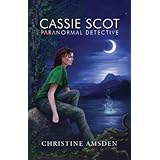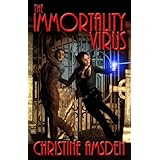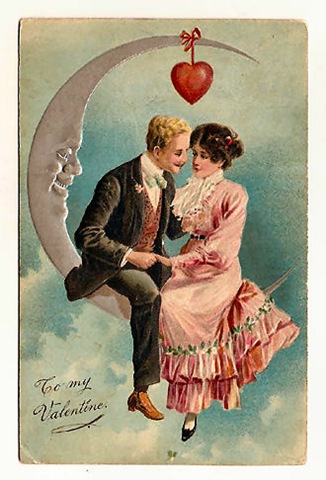http://www.stephanie-osborn.com
This is blog 2 in our Elements of Modern Storytelling: Romance series. It's by Christine Amsden, a very successful and imaginative fellow author at Twilight Times Books. Christine always has some interesting things to say, so let's get to it.
~~~
Christine:
Where does romance fit as an element of modern storytelling?
Where does romance fit as an element of modern storytelling?
Romance is more popular than ever and it's not hard to see why. Modern storytelling is intimate by its very nature, and modern readers want to get to know their favorite characters in ways they never did before. We crave that closeness. That connection. And romance is the ultimate human connection.
These days limited omniscient third person point of view is so commonplace that we scarcely think about it any longer. Back in the old days, if you wanted to get “inside” a character's head, you needed to use a first person perspective. These days that's not necessary. You can use “he” or “she” to your heart's content and still put us right there inside their skulls, sharing everything they think, hear, see, feel, touch, and smell. In fact, readers have come to expect this.
Why? The answer is simple – movies. These days, books have to compete against movies to provide an enthralling storytelling experience. And let's face it, books can never compete with movies on sights or sounds. Classic books often described a scene from the distant perspective of an omniscient narrator. They would set the stage by describing sights and sounds, what the characters looked like and wore, what they acted like and what they said. But this distant narrator rarely got inside a character's head and when it did it wasn't intimate. It was usually just expedient.
Imagine modern books trying to use a distant narrator, when live-action movies can show us sights and sounds so much better? How can a book even hope to compete?
Intimacy. The one thing a book can do that a movie cannot is create a connection between the reader and the character. Whether an author uses first person or third person, the expectation is that we (the readers) get to know him or her in ways that no movie could show us. We want nothing more or less than the deepest desires of their heart, and the attitudes behind them.
Coming back around to romance, it is not hard to see that once you've given us a true connection to your character, the busybodies of the world (and most of us are whether we want to admit it or not) want to see those characters happily settled down with the right man/woman/sentient being. Even if that's not what the story is about, once we've established a true connection to a hero or heroine we look for him or her to establish connections with other people. The same way we do in real life.
Having said that, I often think romance is overemphasized in modern stories. The romantic relationship is not the only way for people to connect with other people. We have friends. Family. Mortal enemies.
I also worry that the romantic relationship is a true fantasy in many stories. And I'm not talking about magic – I'm talking about things that don't happen in the real world. The way love is often presented, it is indistinguishable from lust, and it establishes a false framework for what a real lifelong commitment is about.
One challenge authors face today is reader expectations. And as much as readers swear they'd like to read something different, the truth is usually that they want to see something that pushes them just outside their comfort zone – not something that propels them out of it. Which is why I will be a very old woman before I write the non-happily ever after romance I'd love to try (if I ever do).
In the meantime, I'm trying to use romance to support other aspects of story and character, rather than as a focus for the story. (Or even as a superfluous subplot.) In so doing, I'm hoping to create a subtle honesty to the romance in my stories that belies the traditional lust-based undercurrents. In addition, I'm trying to include other important relationships in my characters' lives.
 My Cassie Scot series is an excellent example of what I mean. A lot of my reviews point to the “family drama” in the series and Cassie's friendships as being as compelling as the romance. Seeing these comments warms my heart because this was exactly what I wanted to do. Cassie will eventually be a wife and mother, but for now she is a daughter, sister (six times over), and a friend.
My Cassie Scot series is an excellent example of what I mean. A lot of my reviews point to the “family drama” in the series and Cassie's friendships as being as compelling as the romance. Seeing these comments warms my heart because this was exactly what I wanted to do. Cassie will eventually be a wife and mother, but for now she is a daughter, sister (six times over), and a friend.
When it comes to the romance in that series, Cassie isn't ready for it yet. Between magic, mystery, romance, and family drama there's a lot to keep her busy but the arc that drives the story is Cassie's personal coming of age story. She can't be with someone else until she's okay with herself (which she's not at first). Thus the romance supports the story/character and not the other way around.
Of course, there are a lot of books out there and a lot of approaches to romance. I am in no way suggesting that every story should be the same. There will always be a place on readers' shelves for steamy or heartwarming romantic fantasies. I read them myself and enjoy them quite a bit.
But as romance is inserted as a co-plot into more and more stories, the opportunities for literature as a whole are endless. I've seen more stories about married couples, for instance, showing us that life doesn't end at “I do.” And there is often a great deal of honesty in these tales.
However it's spun, tales of romance are human connections. And if there is one simple answer I could give to the question of where romance fits as an element of modern storytelling, that would be it: Human connections.
Christine Amsden
http://www.christineamsden.com
Novels:
http://www.christineamsden.com
Novels:
Secrets and Lies (Cassie Scot - Book 2) (December 2013)
Cassie Scot: ParaNormal Detective (May 2013) 2013 Global Ebook Award winner
The Immortality Virus (June 2011), winner of the 2012 Eppie Award
Touch of Fate (November 2007)
Cassie Scot: ParaNormal Detective (May 2013) 2013 Global Ebook Award winner
The Immortality Virus (June 2011), winner of the 2012 Eppie Award
Touch of Fate (November 2007)
~~~
Human connnections. I think she has something there. I knew it would be interesting! Thanks, Christine!
More to come next week with another fellow author!
-Stephanie Osborn





